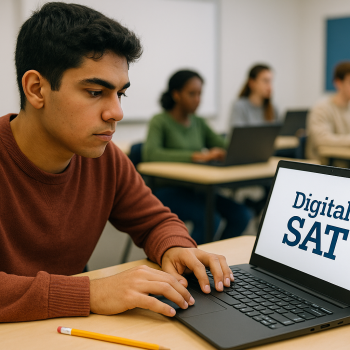Why this matters: SAT and Ben‑Gurion University in one paragraph
Thinking about Ben‑Gurion University (BGU) in Beer‑Sheva? It’s a fantastic choice — strong STEM programs, an innovative research culture, and growing international recognition. For many international applicants, the SAT (now in its digital format) remains a key way to demonstrate readiness for academic work in English. This guide walks you through what we know about SAT expectations for BGU applicants, how to prepare efficiently, and practical next steps for students and families navigating the application process.

Who should read this
If you are a high school student (or a parent of one) applying to Ben‑Gurion University from outside Israel, or an Israeli student applying through an international track — this guide is for you. Whether you’re just beginning to plan or you’re in the final months before application deadlines, you’ll find concrete steps, timelines, and preparation strategies suited to the Digital SAT era.
How Ben‑Gurion University typically treats standardized tests
Universities across the world treat standardized tests differently: some require them, others use them optionally, and some evaluate them mainly for scholarship or placement decisions. In the Israeli higher‑education context, admissions can be multifaceted, often considering high school grades, matriculation results (like the Bagrut), subject tests, English proficiency, and sometimes standardized tests submitted by international applicants.
For international students applying to BGU, submitting standardized test scores (like the SAT) can strengthen an application, especially if your school’s grading scale is unfamiliar to admissions officers. Think of the SAT as a way of speaking a common admissions language — a quantitative signal that helps universities assess readiness relative to global applicants.
Important reminder
Admissions policies change. Always check Ben‑Gurion University’s official international admissions page and contact their admissions office to confirm current requirements and cutoffs. Use this blog to plan, prepare, and interpret typical expectations — not as an official policy statement.
Does Ben‑Gurion University require the SAT?
Short answer: Not universally for all applicants, but often recommended or useful for international applicants. Many Israeli institutions accept a variety of evidence of academic readiness. The SAT can be submitted by international students to demonstrate academic skills in critical reading, writing (as integrated tasks), and math — especially important if your local credentials don’t align neatly with Israeli grading systems.
When is sending SAT scores a good idea?
- If your high‑school grading scale is unfamiliar to international admissions officers.
- If you want to apply for scholarships or honors programs at BGU that consider standardized scores.
- If you plan to apply to competitive programs (e.g., engineering, computer science, biomedical sciences) where test scores can help differentiate applicants.
- If you have strong SAT results that complement your GPA and extracurricular record.
Understanding the Digital SAT: what’s changed and what matters
The SAT is now delivered in a digital format, shorter in length, and adaptive in structure. That changes timing, strategy, and practice methods.
Key differences to keep in mind
- Shorter overall test time — pacing strategies change.
- Adaptive sections — the difficulty of the second module adapts to your performance on the first.
- Different item types — more emphasis on multi‑step reasoning, data analysis, and concise written responses within the test platform.
- Official practice is available digitally (e.g., on Khan Academy and College Board resources), which mirrors the new testing environment.
What an admissions officer at BGU might look for in your SAT
Admissions teams are looking for balanced evidence of preparedness. They want to see:
- Solid quantitative skills for STEM applicants (strong Math section performance).
- Clear reading and analytical abilities for humanities and social science applicants.
- Consistency between your SAT results and your academic record — an outlier high or low score invites explanation or context.
Target scores — realistic benchmarks
Ben‑Gurion doesn’t publish a single SAT cutoff for all programs; however, competitive international applicants to science and engineering programs often present scores in the higher percentiles. Below is a table of illustrative target ranges to help you plan. Use this as a planning tool — not a rule.
| Program Area | Competitive SAT (Total Equivalent) | Focus |
|---|---|---|
| Engineering & Computer Science | 1250–1500+ | Strong Math module, good evidence of problem solving |
| Natural & Life Sciences | 1200–1450+ | Balanced Math and Evidence‑Based Reading |
| Humanities & Social Sciences | 1100–1350+ | Strong reading and analytical skills |
| Interdisciplinary or New Programs | 1200–1450 | Depends on program emphasis; include portfolio or essays |
Note: The Digital SAT reports section‑level information and percentiles. Admissions committees often pay attention to section strengths, not just the total score.
Application strategy: when to take the SAT and how many times
Timing is everything. Aim to have your final SAT score available before the application deadline. Many international applicants take the SAT in spring or fall of their senior year; others prefer earlier so they can retake if needed.
Recommended timeline
- Start familiarizing yourself with the Digital SAT format by the beginning of junior year (or Year 11).
- Take a first diagnostic test 6–9 months before your main application deadline.
- If needed, plan one or two retakes, spaced by at least 6–8 weeks to allow focused study on weak areas.
Most students benefit from 2–3 total sittings: an initial baseline, targeted practice and improvement, and a final polishing test.
How to prepare effectively for the Digital SAT
Preparation that mirrors the test environment produces the best results. Here’s a realistic, student‑friendly plan you can adapt to your schedule.
Monthly plan (6 months)
- Month 1: Diagnostic test + goal setting. Identify weak content areas and establish a realistic target score based on your program choice.
- Months 2–4: Focused content review and strategy. Use official digital practice daily/weekly; practice adaptive‑style sets and timing drills.
- Month 5: Full practice tests in the official digital format, review errors in detail, and strengthen pacing.
- Month 6: Final practice, rest, and test‑day logistics (ID, test center, travel plan).
Study techniques that work
- Do regular, timed practice in the digital interface so you’re comfortable with navigation and tools.
- Analyze mistakes: categorize whether errors are conceptual, careless, or timing‑related.
- Work smart: focus on question types that carry the most weight for your target programs (e.g., data analysis for sciences).
- Simulate test conditions: no phone, strict timing, and minimal breaks to build endurance.
How Sparkl can fit into your prep plan
Many students find the difference between “studying” and “studying well” comes down to structure and feedback. That’s where personalized support can help. Sparkl’s personalized tutoring offers 1‑on‑1 guidance, tailored study plans, expert tutors who understand the Digital SAT format, and AI‑driven insights to identify weakness patterns quickly. If you struggle to create a focused plan, or you want efficient gains with fewer study hours, targeted sessions with a tutor can help accelerate progress without burning out.
Documents and evidence: what to include with your BGU application
Ben‑Gurion may request a mix of academic records, translations, and proof of English proficiency. For international applicants, a strong application package often includes:
- Official high school transcripts and translations (if applicable).
- Documentation of completion of local matriculation exams (e.g., Bagrut equivalent) or predicted grades.
- SAT score reports (if sending standardized test results).
- Proof of English language proficiency if English is not your school’s primary language (some applicants may use SAT Evidence‑Based Reading & Writing as supporting evidence).
- Letters of recommendation, personal statement/essays, and any required program‑specific materials (portfolios, CV, etc.).
Pro tip
If your school’s grade scale is unfamiliar internationally, a solid SAT score plus a brief explanatory note in your application can clarify your academic standing for admissions officers.
Scholarships and placement: how the SAT can help
BGU and Israeli institutions sometimes use standardized test scores for scholarship eligibility or to place students in appropriate course levels. A strong performance on the SAT may open doors to merit awards or honors tracks, and it can help with course placement that ensures you start at the right level.
Common questions families ask
Q: If my SAT is lower than I hoped, should I still apply?
A: Yes. Admissions committees take a holistic view. Emphasize strengths in your application — strong coursework, research projects, internships, personal statements, and letters of recommendation. Consider retaking the SAT if you have time and think you can significantly improve.
Q: Does English proficiency testing replace the SAT?
A: Not necessarily. English tests (like TOEFL or IELTS) measure language skills; the SAT measures academic reasoning in math and evidence‑based reading and writing. Some programs may require language proof in addition to or instead of standardized academic tests. Check program requirements specifically.
Q: Can I submit SAT Subject Tests?
A: SAT Subject Tests were discontinued by the College Board. For subject strength, include AP/IB results, local certificate scores, or course transcripts showing advanced coursework.
Checklist before you submit an application to Ben‑Gurion
- Confirm current admissions requirements on Ben‑Gurion’s official international admissions page.
- Make sure official SAT scores are sent to BGU (use the correct institution code if required).
- Translate and notarize academic documents as requested.
- Prepare a concise personal statement that explains your academic interests and why BGU is the right fit.
- Request letters of recommendation early — give referees at least four weeks’ notice and clear guidance.
Sample application timeline for an international applicant
| Month (Senior Year) | Activity | Notes |
|---|---|---|
| June–August | Finalize university list, take diagnostic SAT | Start focused prep; research program requirements at BGU |
| September–October | Take/retake Digital SAT | Ensure scores will be available ahead of application deadlines |
| November–January | Gather transcripts, translations, and recommendations | Write and polish personal statement |
| February–March | Submit application materials | Confirm receipt with admissions office and address any follow‑ups |
Real‑world examples: how students made the SAT work for them
Example 1: Marina, an applicant from Eastern Europe, had high grades but a school system unfamiliar to Israeli admissions officers. She took the Digital SAT in April, improved her math module on a second sitting, and included her SAT report with her application. The SAT helped translate her academic strengths into a globally understandable metric.
Example 2: Daniel, a student from Latin America, wanted to apply to BGU’s engineering program. He booked focused 1‑on‑1 tutoring with a Sparkl tutor for targeted pacing and adaptive practice. The tutor helped him convert practice improvements into consistent test‑day performance; his final score strengthened his scholarship application.
What to do next — immediate action items for students and parents
- Visit Ben‑Gurion University’s official admissions page and make note of any program‑specific requirements and deadlines.
- Take an initial digital practice SAT to benchmark skills.
- Create a study calendar that allows for at least one full retake if necessary.
- If you want personalized pacing, consider a short series of targeted tutoring sessions (for example, Sparkl’s 1‑on‑1 options) to accelerate gains.
- Prepare translations and request official transcripts early — institutions often require several weeks to verify documents.
Final thoughts: be strategic, not frantic
Applying to an international university like Ben‑Gurion is a marathon and a puzzle. The Digital SAT is one powerful piece of evidence you can offer, but it’s not the only one. Balance your energy between strengthening your academic record, telling your story well in essays, and crafting a clear logistical plan for test dates and document submission. And if the path feels overwhelming, targeted help — a tutor who understands how digital testing changes strategy and how international applications are reviewed — can be the difference between scattered effort and focused progress.

Good luck — and remember: the best preparation combines consistent practice, smart strategy, and clear deadlines. With thoughtful planning and the right support, applying to Ben‑Gurion University can be an exciting step toward a world of opportunity.
If you’d like, I can help you draft a personalized study timeline or a one‑page checklist based on your test dates and current scores — tell me your target program and timeline, and we’ll build it together.















No Comments
Leave a comment Cancel